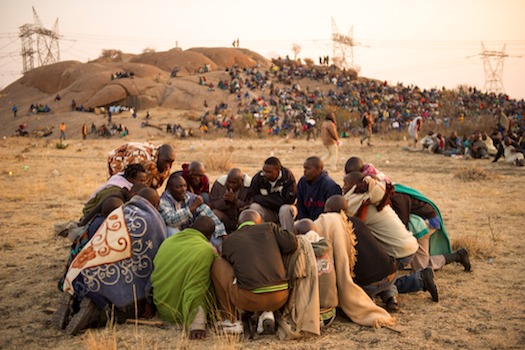- About
- Topics
- Picks
- Audio
- Story
- In-Depth
- Opinion
- News
- Donate
-
Signup for our newsletterOur Editors' Best Picks.Send
Read, Debate: Engage.
| February 08, 2018 | |
|---|---|
| topic: | Natural disaster |
| tags: | #water resources, #Africa, #Cape Town, #Day Zero, #African National Congress (ANC) |
| located: | South Africa |
| by: | Shasha Seakamela |
The Cape region’s rainfall has been far below expected levels for the past three years. According to the latest estimates, May 2018 is when the city’s water supply will be turned off until the rains arrive, leaving residents to line up for water rations at one of 200 points across the city. Despite the current water-saving measures, dam levels are predicted to decline to critically low levels, hence the City of Cape Town (also known as Mother City) has made plans for Day Zero in May 2018 when the municipal water supply will largely be shut off. If this happens, Cape Town will be the first major city to run out of water.
However, one of the biggest debates is whether local government is handling the crisis effectively. Investigating this question exposes the politics, not rainfall, at the heart of the problem. The Western Cape is the only province in the country run by the official opposition party, the Democratic Alliance (DA). South Africa’s ruling African National Congress (ANC) runs the rest. As drought deepens, mismanagement and finger-pointing between the provincial and national governments have only exacerbated the water shortage.
Khaya Magaxa, acting leader of the ruling African National Congress in the province, said the DA's record of mismanagement is partly to blame for this water crisis.
He said this was raised more than five years ago when a serious drought was underway in the western cape due to natural causes, including global warming.
But he said the "DA failed to execute mechanisms" to restrict the use of water and manage the process promptly, to the extent that "we are now reacting in a crisis that is already over our head."
It was in 2007 when South Africa’s national Department of Water and Sanitation warned The City of Cape Town that it would need new water sources by 2015, based on normal rainfall and rising demand. The Department of Water and Sanitation is responsible for planning and implementing schemes to supply water to urban areas, for industries and for irrigation. The deadline was based on normal rainfall and water demand trends. The city took the warning seriously and acted quickly. It implemented a water demand management strategy involving water meter replacements, pressure management, leak detection and free plumbing repairs for indigent households. The strategy was so effective that the city met its 2015-16 water-saving target three years early. This pushed the deadline back to 2019.
Western Cape Premier Helen Zille has slammed Water and Sanitation Minister Nomvula Mokonyane for her department’s role in the Cape Town water crisis.
Speaking at a DA gathering in Cape Town on the party’s plans to beat Day Zero‚ Zille criticised the department’s failure to provide augmentation schemes to prevent water shortages.
“I was the mayor in the mid-2000s and the national department says they warned us then that we would run out of water. Well‚ if they warned us then and it’s their mandate to supply water‚ why didn’t they do it?” said Zille.
In 2015, the national government allocated 60 percent of the Western Cape’s water to Cape Town and most of the remaining 40 percent to agriculture, even as reservoir levels began to grow scarce. Despite appeals by the provincial government, the national Department of Water and Sanitation failed to curb agricultural water use again in 2016. As the severity of the drought became apparent, the Western Cape government lobbied for the province and the City of Cape Town to be declared disaster areas, which would ensure funding to address the crisis. The national government was slow to respond, ultimately declaring only five of the Western Cape’s 30 municipalities as drought disaster areas, snubbing Cape Town in the process. Then disaster struck: a drought more severe than anything in Cape Town’s history.
“What the Premier (Zille) and Mmusi Maimane (DA Leader) are trying to do is to shield the province and their organization from accountability on the water crisis by shifting the blame on the issue to National Government without acknowledgement of the interventions implemented thus far in support of the province by the National government working through the National Disaster Management Centre," said Minister of Water and Sanitation, Nomvula Mokonyane.
As Day Zero approaches and the rains do not come, there are more signs of panic and anger by the city’s residents. In earlier times we would have blamed the gods. However today we blame others. Perhaps the national government should have planned for this. What about the poor? They are too many and do not know how to save water. The provincial government is useless and they are not doing anything. The tourists should go back where they came from. The rich have swimming pools and use more water than all others. The local government is always clueless. Forget about the corrupt politicians, they always find reasons to hide.
While developing additional supplies of water will not make a material difference to dam levels during this summer, these are very important to reduce risk during next summer and beyond. Cape Town should try and implement plans to develop groundwater resources and to build permanent wastewater reuse and desalination capacity at an appropriate scale cost-effectively.
By copying the embed code below, you agree to adhere to our republishing guidelines.
